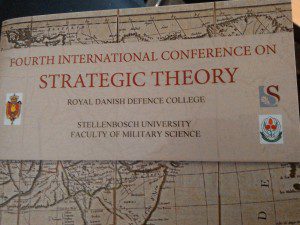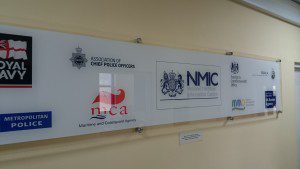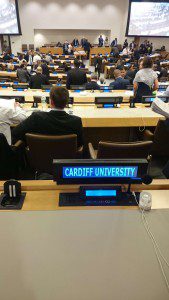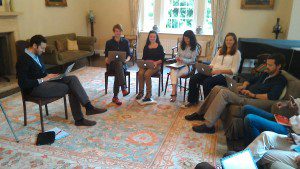 What is the state and future of the African Standby Forces (ASF)? And what should be the main purpose of the forces, peacekeeping, rapid crisis responses, or addressing the broader range of security risks? This was the core theme of the 4th international conference on strategic theory held in Stellenbosch from 16th to 18th September. The event was organized by Stellenbosch University in conjunction with the Royal Danish Defence College and broad together academics, analysts, diplomats and military representatives to discuss the ASF. It quickly emerged that there are quite different viewpoint on the ASF, in particular whether it should be seen as success or failure. From a military viewpoint, the way that the ASF could potentially respond to contemporary crisis situations remains limited. Yet, on the positive side, a substantial number of troops have been trained, and forces have gained much experience in collaboration. In my own contribution to the conference, I asked for the role that the ASF can play in maritime security. I argued for the importance of mainstreaming maritime security and that the issue domain should be part of the discussion of the ASF. The ASF could be a major institutional structure for strengthening maritime security collaboration, in particular for joint law enforcement operations or maritime domain awareness. Further Information and the full conference agenda is available here.
What is the state and future of the African Standby Forces (ASF)? And what should be the main purpose of the forces, peacekeeping, rapid crisis responses, or addressing the broader range of security risks? This was the core theme of the 4th international conference on strategic theory held in Stellenbosch from 16th to 18th September. The event was organized by Stellenbosch University in conjunction with the Royal Danish Defence College and broad together academics, analysts, diplomats and military representatives to discuss the ASF. It quickly emerged that there are quite different viewpoint on the ASF, in particular whether it should be seen as success or failure. From a military viewpoint, the way that the ASF could potentially respond to contemporary crisis situations remains limited. Yet, on the positive side, a substantial number of troops have been trained, and forces have gained much experience in collaboration. In my own contribution to the conference, I asked for the role that the ASF can play in maritime security. I argued for the importance of mainstreaming maritime security and that the issue domain should be part of the discussion of the ASF. The ASF could be a major institutional structure for strengthening maritime security collaboration, in particular for joint law enforcement operations or maritime domain awareness. Further Information and the full conference agenda is available here.
Maritime Domain Awareness in Action: Visiting the UK’s NMIC
 Continuing my tour to centres which share and fuse information in order to enhance maritime security, two weeks ago, I had the opportunity to visit the UK’s National Maritime Information Centre, in short: NMIC. The center is located near Portsmouth, a place it moved to last year in September, having been based prior within the Royal Navy’s headquarters in Northwood. The centre itself was created in 2011 in the run up to the London Olympics. Initial it was meant to facilitate the protection of the UK against threats from the sea during the event. The core idea behind the centre is hence that the rapid response to emergencies at sea is enhanced through a shared information infrastructure. Yet, the work of the center was soon extended to focus on improving the information available for regular law enforcement in ports, coastlines and the country’s Exclusive Economic Zone. All of the ten ministries and agencies of the UK that deal with the sea are participating in the centre whose role is to facilitate conversations and joint actions among these.
Continuing my tour to centres which share and fuse information in order to enhance maritime security, two weeks ago, I had the opportunity to visit the UK’s National Maritime Information Centre, in short: NMIC. The center is located near Portsmouth, a place it moved to last year in September, having been based prior within the Royal Navy’s headquarters in Northwood. The centre itself was created in 2011 in the run up to the London Olympics. Initial it was meant to facilitate the protection of the UK against threats from the sea during the event. The core idea behind the centre is hence that the rapid response to emergencies at sea is enhanced through a shared information infrastructure. Yet, the work of the center was soon extended to focus on improving the information available for regular law enforcement in ports, coastlines and the country’s Exclusive Economic Zone. All of the ten ministries and agencies of the UK that deal with the sea are participating in the centre whose role is to facilitate conversations and joint actions among these.Paper on practice turn in IR now in print.
 What are the promises of practice theory for the study of global politics? The paper titled “The play of international practices” co-authored with Frank Gadinger explores this question. It is now out in International Studies Quarterly 59(3). It is available as open access here. This is the abstract:
What are the promises of practice theory for the study of global politics? The paper titled “The play of international practices” co-authored with Frank Gadinger explores this question. It is now out in International Studies Quarterly 59(3). It is available as open access here. This is the abstract:
The core claims of the practice turn in International Relations (IR) remain ambiguous. What promises does international practice theory hold for the field? How does the kind of theorizing it produces differ from existing perspectives? What kind of research agenda does it produce? This article addresses these questions. Drawing on the work of Andreas Reckwitz, we show that practice approaches entail a distinctive view on the drivers of social relations. Practice theories argue against individualistic-interest and norm-based actor models. They situate knowledge in practice rather than “mental frames” or “discourse.” Practice approaches focus on how groups perform their practical activities in world politics to renew and reproduce social order. They therefore overcome familiar dualisms—agents and structures, subjects and objects, and ideational and material—that plague IR theory. Practice theories are a heterogeneous family, but, as we argue, share a range of core commitments. Realizing the promise of the practice turn requires considering the full spectrum of its approaches. However, the field primarily draws on trajectories in international practice theory that emphasize reproduction and hierarchies. It should pay greater attention to practice approaches rooted in pragmatism and that emphasize contingency and change. We conclude with an outline of core challenges that the future agenda of international practice theory must tackle.
New book chapter on ANT available as pre-print
Our introductory text to Actor-Network Theory is available as pre-print. The chapter titled “Actor-Network Theory. Objects and Actants, Narratives and Networks” is authored jointly with Jan Stockbruegger. It is forthcoming in “Technology and World Politics: An Introduction”, edited by Daniel R. McCarthy (Abingdon: Routledge) which is a textbook for advanced graduate students. In the chapter we provide a succinct introduction to Actor Network Theory (ANT) and how it has been discussed in International Relations. Arguing that ANT offers “empirical theory” we review a range of classical ANT studies and discuss what concepts they develop. We continue in exploring what one can “do” with ANT to study international relations and global politics. The chapter is available through my Academia page, and can be accessed here.
APSA Meeting in San Francisco
 From the 2nd to the 6th of September I will be attending the annual conference of the American Political Science Association in San Francisco. I will be a participant on two panels. I will be discussing fieldwork methods in the frame of “The Methods Cafe” (Thu, September 3, 12:15 to 1:45pm, Nikko, Ballroom II) as well as presenting on a roundtable “Author Meets Critics: “A Theory of Contestation” by Antje Wiener” (Sun, September 6, 8:00 to 9:45am, Parc 55, Fillmore).
From the 2nd to the 6th of September I will be attending the annual conference of the American Political Science Association in San Francisco. I will be a participant on two panels. I will be discussing fieldwork methods in the frame of “The Methods Cafe” (Thu, September 3, 12:15 to 1:45pm, Nikko, Ballroom II) as well as presenting on a roundtable “Author Meets Critics: “A Theory of Contestation” by Antje Wiener” (Sun, September 6, 8:00 to 9:45am, Parc 55, Fillmore).
Pirates @ PublicUni, Cardiff, Chapter
As part of the 6th PublicUni event, 6th of August, at the Chapter Arts Centre Cardiff, I will discuss my research on pirates. The idea of PublicUni is to present ongoing research short and crisp in an accessible manner (more info here). In my talk I address the question ‘Whatever happened to the Somalia pirates?’ Since Captain Phillips hit the movie theatres two years ago, it has become remarkably quiet about the pirates of Somalia. I hence will explains the rise and fall of piracy. For the other speakers at the event see the program here. A very short summary of the event is available here.
Meeting with Chief of Staff to President of Somalia
On the 24th of July I had the pleasure to meet Ali Omar, Chief off Staff to the President of Somalia, during his visit to the University of Bristol. Over lunch with some colleagues we discussed the importance of maritime security for Somalia. Naturally the governance of its territorial waters is not the number one priority of the government given the vast security and governmental challenges that exist. However, the maritime is a significant opportunity for the government not only to generate revenue, but also to strengthen its profile in multi-lateral settings.
Science Diplomacy Writeshop @ Oxford
The concept of “science diplomacy” has become an increasingly fashionable way of discussing both the role of science and technology within global governance as well as how science itself constitutes a field of diplomacy. At a one and a half day workshop at Exeter College, from 12.-13.7., we are meeting to discuss the concept and how it can be used as a starting point for an innovative agenda. The goal is to identify mechanisms as well as cases representative of the science/diplomacy interaction. The event is part of the new science diplomacy project of the Department of Science, Technology, Engineering and Public Policy (STEaPP) of the University College London.
Summary of 18th CGPCS Plenary
 Last week I attended the plenary of the CGPCS at the UN headquarters. I published summaries of the main discussions of the working group meetings and the plenary on the website of the CGPCS. Find them published here. For the first time the plenary has also been recorded and is available on UN web tv (part 1, part 2). During the plenary I gave an update on the Lessons Learned Project and also presented our forthcoming article on the future of the maritime security architecture in the Western Indian Ocean.
Last week I attended the plenary of the CGPCS at the UN headquarters. I published summaries of the main discussions of the working group meetings and the plenary on the website of the CGPCS. Find them published here. For the first time the plenary has also been recorded and is available on UN web tv (part 1, part 2). During the plenary I gave an update on the Lessons Learned Project and also presented our forthcoming article on the future of the maritime security architecture in the Western Indian Ocean.
In the field: plenary of CGPCS
Over the next week I am attending the plenary meeting of the Contact Group on Piracy off the Coast of Somalia (CGPCS). The group is the main global governance mechanism to steer and coordinate the global fight against Somali piracy (FAQ). The group is the major case study of my ESRC project “Counter-Piracy Governance” and I am working for the group in a lessons learned project. Since I attended my first plenary meeting in 2013, the group has been quite radically transformed in the face of the decline of piracy in the region. Not only is there growing uncertainty about the purpose of the group, but it is unclear what efforts of capacity building and ongoing patrols will be needed to sustain the current containment. The program of the plenary reflects this, in that only two of the working groups are meeting. Both the working group on capacity building and operations will focus on discussing the results of technical subgroups. They will meet a day prior to the plenary on Wednesday. On Thursday there will be an offside event focused on the African Maritime Security Architecture.
